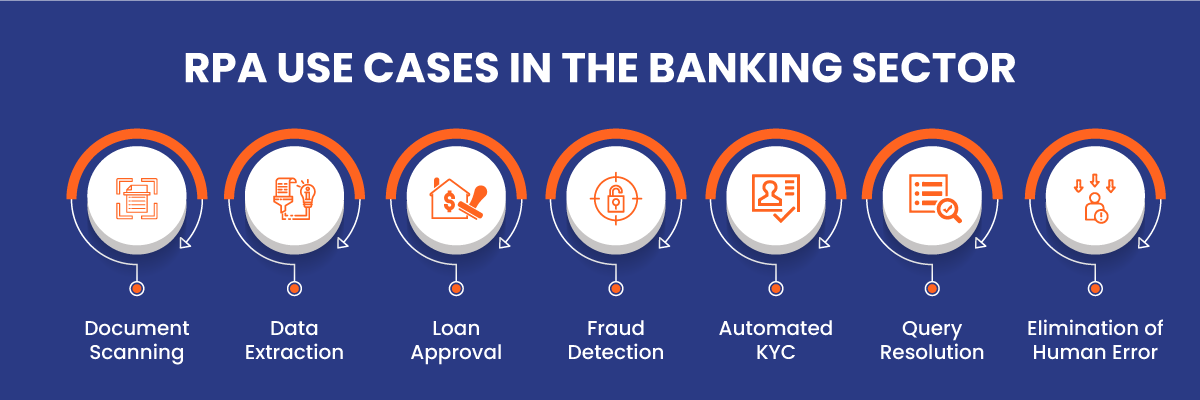Automate Mundane, Repetitive Banking Processes With RPA
Did you know- employees spend around 40% of their time doing things that can be easily automated? This is specifically true in banks where employees are overwhelmed with manual data entry tasks, paper filling, scanning and so on. However, in this era of automation, these processes can easily be automated. This is where Robotic Process Automation – RPA in banking and finance Industry– comes in. Banks can leverage scripts, programs or bots having the capability of performing repetitive tasks by adhering to a set of rules specified in the script or code. Imagine if RPA saves just 20% of employees’ time- how huge the increase in productivity will be!
What RPA Actually Is in Terms of Banking?
Banking processes are considered knowledge work. However, there are certain processes that don’t require any ‘knowledge’ per se to be completed. These are termed ‘rules-based’ processes.
There are some standard features of every rules-based process:
- These processes require a certain set of rules or instructions, or steps to be followed.
- These steps are usually followed one by one with no skipping.
- These steps are specific and measurable.
- Rules-based processes do not require any intellectual or emotional judgement.
As you can see from the features of rules-based processes, these tasks can easily be done by a program. Every program is intrinsically an instruction-following system. You give a program instructions, and it does its work as per the instructions provided.
Once the rules in a rules-based process are transformed into programmatic instructions, an RPA bot can be created based on those instructions. Such an RPA bot helps you automate the task by performing the rules embedded in its code.
Importance of RPA in the Banking and Finance Industry
Among many industries, the banking and finance industry is the one where employees have to spend too much time on manual processes.No; we aren’t just talking about document-related processes. Many aspects of loan approval, account opening, customer service etc., are manual or rules-based in nature.
Automating this huge amount of rules-based processes in banks and other financial institutions can save a dramatically significant amount of time. Workers in banks are too overworked. Even if 20% of the processes can be automated with RPA in the banking and finance sector, it will enable them to focus on what’s important.
Here are some of the rules-based processes in banks that can be automated with RPA:
- Document scanning
- Data entry
- Monitoring account-related activity and ensuring the security of customers
- Alerting customers
- Marketing automation
- Account opening tasks
- Data verification
- Loan approval
Hence, you can see a lot of manual work done in banks can be automated using RPA. Remembered.
Ready to Transform your Banking Operations with RPA? Start your Journey Towards Efficiency and Accuracy.

Key Benefits of RPA in the Banking and Financial Industry
So what exactly are the challenges that are solved by RPA? There is more than one:
RPA Stops Loss of Productivity
As we said in the very beginning, employees across industries spend around 40% of their time doing manual mundane tasks. RPA automates these tasks empowering banks to focus on more productive tasks.
RPA Improves Efficiency and Accuracy of Banks
Although manual processes are boring, they are quite important for banks to function properly. At the same time, doing these tasks manually introduces human errors. Automating these tasks with RPA for banking industry does not just boost the productivity and efficiency of banks but also decreases the likelihood of human errors creeping into the system.
RPA Plays an Instrumental Role In Digitally Transforming Banks
Digital Transformation is not just about cloud computing, containers and all those advanced technologies. Before you adopt these advanced technologies, a bank needs to have an automated system in place to digitise records and be proactive and more agile. Agility is the bedrock of Digita Transformation.
Significantly Cut Costs With RPA
As you save 40% of your time in automating processes with RPA, your team can focus on more profitable tasks. RPA can keep your team lean, enabling you to save money on human resources and training.
Above All, Improve Customer Service With RPA
As your company becomes more agile with RPA, efficiency and accuracy will translate to more wholesome customer service. For example, you can use an automated customer query resolution mechanism that can answer frequently asked questions. This way, your company remains ever-ready to serve your customers.
RPA Use Cases in the Banking Sector
Banks and other financial institutions have already been using RPA to automate a variety of processes. Here are some use cases for RPA in the banking sector:

Document Scanning
Although almost every bank in the UK provides online account opening facilities, a significant percentage of people still prefer offline account opening. And such an offline account opening process involves a lot of paperwork.
The problem is. Banks need to digitise and store the documents filled up by the customers in bank servers. This means an additional job of typing the data into the system. This is where RPA comes in.
Since bank documents are usually in a structured form, an RPA bot can read the data off it and store the data in the desired digital format – without manual intervention.
Data Extraction
Have you ever noticed this when you send emails to banks and other financial institutions – they ask you to write the subject line in a certain way? Some ask you to add your account number in the subject line; some ask you to mention the previous reference number in the subject line if you already have one. Why? That’s because RPA bots can extract this data and automatically do the initial actions – like sending your query to the relevant department etc.
Banks can benefit from automated data extraction in many different ways. Across the world, banks use data extraction to extract key information from online and offline documents enabling them to make internal processes faster. The marketing department, too, can use data extraction from reviews and Twitter posts to reply to people having complaints – they don’t need to read each and every review. There are many possibilities!
Loan Approval
Loan approval is yet another manual process-intensive work that banks and other financial institutions do. There is more than one aspect of the loan approval process that can be automated with RPA in the banking and financial sector.
1. Document Collection:The preliminary step in every loan approval process is collecting customers’ documents – from bank statements to tax details, from identification documents to employment details. Using an automated system to collect all these documents in a digitised format can save a lot of time and resources.
2. Verification and Validation Another boring but important step in the loan approval process is validating whether the customer has filled in all the necessary fields and submitted all the necessary docs. This validation task can easily be automated with RPA for the banking industry.
3. First Level Filtering RPA can even do the task of filtering out people who can’t be granted loans – based on some predetermined criteria. For example, a person who does not fall under a certain tax bracket can automatically be filtered using RPA.
Fraud Detection
Much like loan processing, RPA in the banking and financial sector can be tuned in a way that it alerts the bank whenever any out-of-the-ordinary activity happens in a customer’s account. This can be achieved using an automated pattern detection mechanism.
Automated KYC
Banks in the UK have to mandatorily validate customer information and collect their identification documents. This paperwork can easily be automated. And no, we aren’t just talking about collecting documents. RPA in banking sector can collect, verify and even nudge customers to submit their KYC documents if pending.
Query Resolution
Here’s a specific case study on how HSBC made its query resolution process faster and more efficient. It is one of the finest examples of RPA in banking. At first, it implemented an RPA software to track queries – from the originating point to various departments of the bank until it reaches the one that resolves it. Over time, the RPA software was able to find a pattern in how queries were resolved. This enabled the software to route specific queries to specific departments directly – the queries stopped bumping from one irrelevant department to another. This saved HSBC a significant amount of time.
Automating The Communication Between Legacy Systems
Banks can’t keep on innovating. They need to have a stable system. And this creates the problem of using legacy systems for years. These legacy systems used by banks don’t really ‘talk’ to each other. Banks regularly use RPA to enable seamless communication between these legacy systems. For example, a bank is leveraging RPA to connect the SAP ERP system with its card management system.
Elimination of Human Error
As RPA automates manual, repetitive tasks, it removes the possibility of human errors. If the instructions and data are correct, RPA will automate the manual job flawlessly with minimal to no errors.
RPA Opportunities in the Banking and Financial Sector
You May Also Like to Read: Role and Scope of Robotics Process Automation in the Healthcare Industry
As you can see, RPA bots and scripts have a huge role to play in the banking sector. From automating data entry tasks to pattern recognition, from fraud detection to proactive customer service, RPA has been solving the process challenges faced by banks for years now. With the rise of big data, banks will need RPA in a more intense way than ever. It is not possible for banks to manually analyse the data and automate processes based on that data. Hence, more and more banks will integrate RPA with their Data Warehouse to leverage real-time automation.
Future of RPA In Banking
Competition among banks in the UK has been rising at a steady pace since 2022. RPA is a potent tool at the disposal of forward-thinking banks that can make them more efficient, more customer-centric and more competitive. And with the rise of modern technologies, older banks need to find a mechanism to integrate newer technologies with the legacy tools. This mechanism can be created with RPA. Hence, the demand RPA in banking and financial sector is going to increase rapidly in the future as more and more traditional banks start investing in newer technologies.
How to Implement RPA in Banking
RPA is a very specialised field of technology. Banks need to hire talented IT executives with knowledge in Python, Java and C – along with knowledge of the database platform used by the bank. Along with that, they need people who are adept in using automation tools like UiPath.
To delve deeper, follow these two specific guidelines shared by HSBC-
Start Small, Start Local
Implementing RPA involves a lot of A/B testing. The first iteration will rarely be successful. So, HSBC suggests other banks go ahead with the RPA project on a smaller scale at first. The guide specifically talks about the ‘art of possible’ where a company starts small to gain specific wins in the micro context and then gradually starts replicating the wins in a macro context. This way, you can keep the investment in RPA projects within a small budget, and you will be more comfortable knowing that even if the bank fails to achieve its goals, it won’t be burning too much money. This leaves space for A/B testing.
Add Complexity Gradually
As a bank gains success regionally with its RPA, it can then scale up the RPA software and use it in more and more branches and for many other automation jobs. So, for example, HSBC used its RPA bot to first identify the pattern in its query resolution mechanism. Once that was done, it went on to add more complexity to the RPA software so that it could now guide a specific query to the relevant department directly.
Contact Silver Touch Technologies for a Feasible & Practical RPA Software Implementation
Implementing RPA in banking and finance industry requires a thorough knowledge of the database platform used by the specific bank, the ERP and CRM platforms used, and all the other management platforms used by the bank.
As you can see, implementing RPA software for a bank is a very personal affair. Contact Silver Touch Technologies for a well-planned RPA project. We work with your internal IT team to understand the technologies used by your bank.
We at Silver Touch Technologies believe that keeping our goals aligned with YOUR goal is what makes an RPA implementation successful. What exactly are you trying to achieve with RPA? What challenges are you trying to solve? We find the answers to these questions. That makes SilverTouch Technologies the best RPA solutions provider in the UK.





